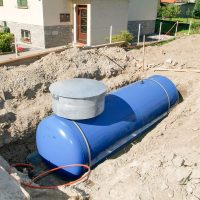AST/UST Registration for Backup Generator Fuel Tanks in New Jersey and Florida

Backup generator fuel tanks are essential for ensuring continuous power supply during emergencies. These tanks, whether aboveground (ASTs) or underground (USTs), require proper registration and compliance with state regulations. In New Jersey and Florida, specific requirements govern the registration of these storage tanks to ensure safety and environmental protection. This blog post summarizes the key registration requirements for ASTs and USTs in these states. For help with AST or UST installation, removal, servicing, or site remediation in New Jersey or Florida, contact the experts at Lutz Tanks for quality performance from experienced professionals you can trust.
New Jersey AST/UST Registration Requirements
In New Jersey, the Department of Environmental Protection (NJDEP) oversees the registration and regulation of ASTs and USTs. The following are the key steps and requirements for registering backup generator fuel tanks:
Online Registration System
New Jersey utilizes an online system called eNJEMS (New Jersey Environmental Management System) for the registration and management of storage tanks. This system streamlines the process and ensures accurate record-keeping.
Registration Process
-
Initial Registration: All new ASTs and USTs must be registered with the DEP before installation. This includes providing detailed information about the tank, such as its size, location, and intended use. Owners and operators of USTs must complete and submit a Facility Certificate Questionnaire and pay the required fee.
-
Renewal: Tank registration certificates are good for three years and must be renewed after receiving an invoice from NJDEP. The renewal process involves updating any changes to the tank’s status or condition, submitting a new Facility certificate Questionnaire, and paying the required fees.
-
Notification of Changes: Owners must notify the DEP of any significant changes to the tank, including repairs, replacements, or removals. This ensures the DEP has up-to-date information for safety and compliance purposes. Once again, the Facility Certificate Questionnaire provides a guide to whether registration must be modified. The sale or transfer of facility ownership, a change in the type of hazardous substances stored, or a substantial modification of the tank system are all reasons that could require a modification,
Compliance and Inspection
Registered tanks are subject to regular inspections to ensure compliance with state regulations. These inspections may include checks for leaks, structural integrity, and proper maintenance practices. Non-compliance can result in fines and mandatory corrective actions.
Florida AST/UST Registration Requirements
In Florida, the Department of Environmental Protection (DEP) is responsible for the registration and regulation of ASTs and USTs. The following outlines the essential requirements for registering backup generator fuel tanks:
Facility Registration
Florida requires all storage tank facilities, including those with backup generator fuel tanks, to be registered with the DEP. This registration ensures that the state can monitor and regulate the storage of hazardous substances.
Registration Process
-
Initial Registration: Facilities with new ASTs or USTs must complete an initial registration form and submit it to the DEP. This form collects information on the tank’s size, type, location, and the substances stored.
-
Renewal and Updates: Registration of storage tank system equipment and release detection systems and methods must be renewed by the equipment manufacturer or vendor every five years, with updates provided for any changes to the tank’s status. This includes modifications, repairs, or changes in the substances stored.
-
Fees: Registration involves the payment of fees, which are determined based on the type and size of the tanks. These fees support the DEP’s regulatory and inspection activities.
By registering with the DEP Business Portal (https://www.fldepportal.com/) as a first step, you’ll be able to pay invoices online, print placards, and update facility information as needed.
Compliance and Inspection
The DEP conducts regular inspections of registered tanks to ensure compliance with state regulations. These inspections focus on leak detection, corrosion protection, and overall tank integrity. Facilities must maintain records of inspections and maintenance activities for review by the DEP.
Contact Lutz Today for Help With USTs and ASTs in Florida and New Jersey
Proper registration and compliance with state regulations are crucial for the safe and efficient operation of backup generator fuel tanks. In New Jersey and Florida, tank owners must adhere to specific processes and requirements to ensure their tanks are registered correctly and maintained in compliance with state laws. By following these guidelines, tank owners can help protect the environment and ensure the reliability of their backup power systems.
For help with the installation, maintenance, or removal of underground storage tanks on your property, contact Lutz Petroleum Equipment Installation in Florida at 954-971-5222 or Herbert Lutz Co., Inc. in New Jersey at 908-862-8888.
